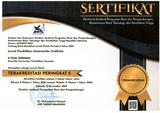PENGARUH MODEL-ELICITING ACTIVITIES (MEAs) TERHADAP KEMAMPUAN PEMECAHAN MASALAH MATEMATIKA SISWA KELAS VII SMP NEGERI 2 SINGARAJA
DOI:
https://doi.org/10.23887/jjpm.v3i1.5900Abstract
Penelitian ini bertujuan untuk mengetahui apakah kemampuan pemecahan masalah matematika siswa yang mengikuti pembelajaran Model-Eliciting Activities (MEAs) lebih baik daripada kemampuan pemecahan masalah matematika siswa yang mengikuti pembelajaran konvensional. Populasi pada penelitian ini adalah seluruh siswa Kelas VII SMP Negeri 2 Singaraja, yaitu sebanyak 550 siswa (kelas unggulan yaitu VII.14 dan VII.15, kelas non-unggulan sebanyak 13 kelas lainnya). Pengambilan sampel dilakukan dengan teknik cluster random sampling untuk mendapatkan 2 kelompok sampel (Kelas VII.1 dan VII.14 sebagai kelompok eksperimen, Kelas VII.2 dan VII.15 sebagai kelompok kontrol). Desain penelitian yang digunakan dalam penelitian ini adalah post-test only control group. Data kemampuan pemecahan masalah matematika siswa dikumpulkan melalui tes kemampuan pemecahan masalah matematika. Data yang diperoleh kemudian dianalisis dengan menggunakan uji-t satu ekor. Hasil analisis data mendapatkan rata-rata skor kelompok eksperimen = 31,17 dan kelompok kontrol = 20,19, serta harga thitung = 10,6443 sedangkan harga t(0,05;143) = 1,9767. Ternyata . Berdasarkan hal itu, diperoleh bahwa skor kemampuan pemecahan masalah matematika siswa yang mengikuti pembelajaran Model-Eliciting Activities (MEAs) lebih baik daripada siswa yang mengikuti pembelajaran konvensional. Hal ini beralasan karena didukung oleh fakta-fakta empiris bahwa siswa yang mengikuti pembelajaran MEAs mampu membuat model matematika dari permasalahan sehingga siswa mampu memahami soal secara mendalam, memilah informasi yang penting untuk digunakan, dan siswa terbiasa untuk menyelesaikan permasalahan secara matematis dibandingkan dengan siswa yang mengikuti pembelajaran konvensional.Kata Kunci : kemampuan pemecahan masalah, matematika, Model-Eliciting Activities
This research was aimed to determine wether mathematical problem solving ability of students who studied with Model-Eliciting Activities (MEAs) learning model better than mathematical problem solving ability of students who studied with conventional learning. The population in this study was all seventh grade student of SMP Negeri 2 Singaraja, as many as 550 students (excellent class is VII.14 and VII.15, and thirteen others grade non excellent classes). Sampling was done by cluster random sampling technique to obtain two sample classes (VII.1 class and VII.14 were experiment group, VII.2 and VII.15 were control group) . The research design was Post-test Only Control Group Design. The data of mathematical problem solving ability of students were collected through mathematical problem solving ability test. This data were analyzed using one-tailed t-test. The analysis result obtain the value of the average skor as experimental group = 31,17 and the control group = 20,19, t-arithmatic = 10.6443 while the value of t (0.05; 143) = 1.9767. It turns out t-arithmatic > t-table , Therefore the mathematical problem solving ability scores of students who studied with Model-Eliciting Activities (MEAs) better than the students who studied with conventional learning. This result was strengthen by the fact that the students who took the MEAs learning were more to create a mathematical model of the problem so the students can understand the problem in depth, sorting out important information to be used, and students are accustomed to resolving problems mathematically compared to students who took conventional learning.
keyword : problem solving ability, mathematic, Model-Eliciting Activities
Published
2015-08-07
Issue
Section
Articles
License

Jurnal Pendidikan Matematika Undiksha is licensed under a Creative Commons Attribution-ShareAlike 4.0 International License.





